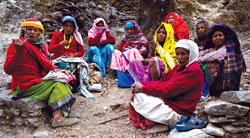|
|
| A RARE CHANCE: Nanu Devi Joshi, of Bajedi Bajura suffered a uterine prolapse 18 years ago but lived in shame until the mobile health camp doctors sent her for surgery in Nepalganj. Local women from Melbisauna (right) share their experiences after a check-up. |
Hira Thapa, 66, suffered a uterine prolapse 15 years ago. Mother of 10 children, she gave birth to them at home in Rilu village.
"My uterus was hanging, the pain I experienced every day was excruciating," she says. She decided to seek treatment and walked for several hours in the winter sun to get to the mobile health camp.
The doctors at the camp inserted a pressary ring to stop the uterus from descending. Unlike some of the other women who came to the camp, Thapa only suffered a second-degree prolapse, not the most severe form, and would not require surgery.
"If the woman is under 50 and suffers from a third-degree prolapse, we would advise that she undergo surgery to remove the uterus," explains Sita Jirel, Auxiliary Nurse Midwife (ANM) with the Adventist Development and Relief Agency, Nepal (ADRA)"but she is over 50 and may not be able to overcome the risks associated with the surgery."
ADRA is running five four-day camps in six districts of far west Nepal with UNFPA and the European Commission's Humanitarian Aid department (ECHO). A 2006 study estimated that 10 percent of Nepali women between the ages of 15-49 years suffer from uterine prolapse. There are many factors behind the high incidence in Nepal: women marry young and bear children at an early age, they give birth to many children but receive almost no pre- and post-natal care, they do heavy work immediately after delivery.
"Many women in the villages are silently suffering because they think it is natural for all women of a certain age," says Rajendra Gurung, a public reproductive health expert with UNFPA.
Bajhang itself is remote, but places like Melbisauna are in remote parts of the district. People here have waited for years for mobile clinics like this one to arrive, and although they are for women the doctors treat all kinds of other ailments as well. No one is turned away, which means the doctors see 200 patients a day. Severe cases are referred to Nepalgunj Medical College, a two-day journey away.
|
|
Last year the mobile camps provided reproductive health services to 29,000 patients and operated on 118 prolapsed cases. This year, 50 cases of third degree uterine prolapse each from Bajhang, Bajura and Jumla were sent to Nepalganj for surgery. "We only have funds to send a limited number of women for surgeries, but we often exceed the quota," says Bidya Mahat of ADRA, "it is a dilemma because we cannot turn the others away."
Public health experts agree that the biggest challenge they face when it comes to uterine prolapse is poverty, insufficient information and lack of awareness about reproductive and public health in rural Nepal.
"Uterine prolapse is not just a health issue it is about poverty, it is about rights, and empowerment of women," says Gurung, citing how women with the afflication are often ostracised. But he adds: "We can only do so much, currently we can't reach all the women with this condition in Nepal."




